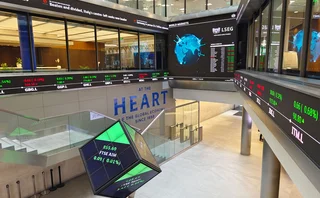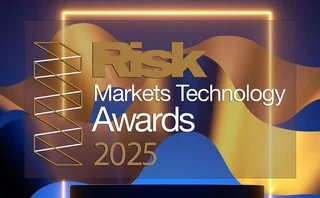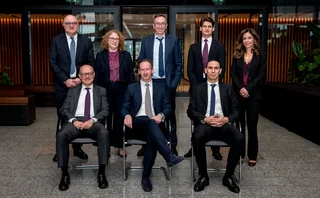
ETF house of the year: Commerzbank
German lender reaps benefits of scale

Structured Products Asia Awards 2016
For Commerzbank, big is beautiful. The German bank has made a name for itself for its ability to quote, regularly and reliably, for the broadest range of ETFs.
"Our aim is to be able to show prices on almost everything to almost anybody," says Antoine De Saint Vaulry, head of ETFs and flow trading for Asia at Commerzbank in Hong Kong. "We are focused on bringing liquidity where it is lacking, because there's a clear lack of a committed market-maker for ETFs in Asia."
The bank is the biggest ETF market-maker on the Hong Kong Exchange (HKEx), being the official market-maker for 118 of HKEx's 169 listed ETFs. It is a designated market-maker on the Singapore and Thai Stock Exchanges, and quotes onscreen prices in Japan, Australia, South Korea and Taiwan.
Clients testify to the bank's reliable presence as an ETF market-maker, offering prices when most in need. Indeed, the bank often stands in to provide liquidity in Asian product launches.
"When [ETF issuers] need an official market-maker when they launch a product, I think most of them go to Commerz," says Carmen Cheung, head of ETFs for Mirae Asset Management, which has used the bank for such purposes in the past.
Our aim is to be able to show prices on almost everything to almost anybody. We are focused on bringing liquidity where it is lacking, because there's a clear lack of a committed market-maker for ETFs in Asia
Antoine De Saint Vaulry, Commerzbank
The bank has a mandate in Asia to trade any ETF regardless of its underlying, such as commodity ETFs quoted rarely by rivals. Its product coverage includes fixed-income ETFs and money market ETFs, as well as smart beta and small ETFs that may only trade once a year.
"We try to be here every day for size on those ETFs," says De Saint Vaulry, who says the company defines its success on the smaller, rarely traded ones.
Two key areas of potential growth stand out. The first is South Korea. Institutional investors there are increasingly interested in ETFs, he says, due to tax benefits from investing in foreign markets. De Saint Vaulry estimates there is $100 million of daily trading in foreign listed ETFs in the country, mainly in products listed in the US, Europe, Hong Kong and Japan.
The second are is levered and inverse ETFs in Hong Kong - already wildly popular in Japan - which the company sees as a "game-changer" for retail investment in ETFs.
When Samsung Asset Management issued two such products in May, Commerzbank acted as one of the two official market-makers. The bank expects interest to jump if Hong Kong's Securities and Futures Commission permits trading of ETFs with underlying Hong Kong- and China-listed equities.
The flipside to providing liquidity in Asia is that Commerzbank is not as speedy as some rivals, though no clients Risk.net spoke to had cause to complain. "We are not the quickest market-maker in terms of market access, systems and everything. Our system is fast but not as fast as some others. We are not an arbitrage house," says De Saint Vaulry.
"Especially in Asia, the volume is very concentrated on the main ETFs, which are mostly traded by arbitrage houses. We would rather cover the biggest range of ETFs than trade the most."
Nevertheless, the German bank is concentrating investment on cranking out faster calculations and faster prices. "Being as quick as possible is key to being able to show accurate and up-to-date prices," he says.
The bank's focus is still on reliability. For instance, it continued to trade in the volatile aftermath of the UK's vote to leave the European Union. "We cover vast numbers of ETFs in Asia, so we were able to keep providing liquidity - losing money on some, gaining money on others," says De Saint Vaulry.
The market-making business at Commerzbank is also integrated, such that the Frankfurt office does not charge the Asia desk a fee to add to or unwind its positions.
"Most of our competitors don't have that kind of luxury: they are very siloed. We don't because we consider it one business," he says.
The bank listed two ETFs on the HKEx in May - the first Hong Kong-listed products to track German equities - but the indexes have had a modest uptake. The ComStage 1 Dax Ucits ETF has lost 10% since first launching in November. The ComStage 1 DivDax Ucits ETF, which tracks high-dividend companies, dropped by 21% after launching in the same month but has recovered most of its losses.
"Consumer demand has not really picked up yet, but it's more due to bad market conditions than anything. Most ETFs, especially in Asia, struggle at the beginning," says De Saint Vaulry.
Only users who have a paid subscription or are part of a corporate subscription are able to print or copy content.
To access these options, along with all other subscription benefits, please contact info@risk.net or view our subscription options here: http://subscriptions.risk.net/subscribe
You are currently unable to print this content. Please contact info@risk.net to find out more.
You are currently unable to copy this content. Please contact info@risk.net to find out more.
Copyright Infopro Digital Limited. All rights reserved.
As outlined in our terms and conditions, https://www.infopro-digital.com/terms-and-conditions/subscriptions/ (point 2.4), printing is limited to a single copy.
If you would like to purchase additional rights please email info@risk.net
Copyright Infopro Digital Limited. All rights reserved.
You may share this content using our article tools. As outlined in our terms and conditions, https://www.infopro-digital.com/terms-and-conditions/subscriptions/ (clause 2.4), an Authorised User may only make one copy of the materials for their own personal use. You must also comply with the restrictions in clause 2.5.
If you would like to purchase additional rights please email info@risk.net
More on Awards
Clearing house of the year: LCH
Risk Awards 2025: LCH outshines rivals in its commitment to innovation and co-operation with clearing members
Best use of machine learning/AI: CompatibL
CompatibL’s groundbreaking use of LLMs for automated trade entry earned the Best use of machine learning/AI award at the 2025 Risk Markets Technology Awards, redefining speed and reliability in what-if analytics
Markets Technology Awards 2025 winners’ review
Vendors jockeying for position in this year’s MTAs, as banks and regulators take aim at counterparty blind spots
Equity derivatives house of the year: Bank of America
Risk Awards 2025: Bank gains plaudits – and profits – with enhanced product range, including new variants of short-vol structures and equity dispersion
Law firm of the year: Linklaters
Risk Awards 2025: Law firm’s work helped buttress markets for credit derivatives, clearing and digital assets
Derivatives house of the year: UBS
Risk Awards 2025: Mega-merger expected to add $1 billion to markets revenues, via 30 integration projects
Interest rate derivatives house of the year: JP Morgan
Risk Awards 2025: Steepener hedges and Spire novations helped clients navigate shifting rates regime
Currency derivatives house of the year: UBS
Risk Awards 2025: Access to wealth management client base helped Swiss bank to recycle volatility and provide accurate pricing for a range of FX structures
Most read
- Top 10 operational risks for 2025
- For US Treasury algos, dealers get with the program
- DeepSeek success spurs banks to consider do-it-yourself AI























